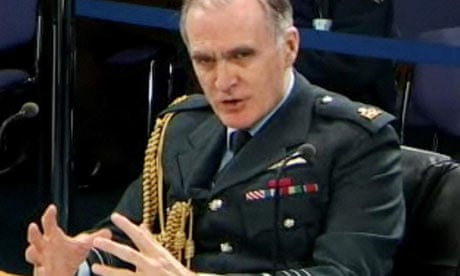Sir Jock Stirrup is to step down as the chief of the defence staff several months earlier than planned following criticism of his stint as head of the armed forces.
The defence secretary, Liam Fox, said Stirrup would leave in the autumn, adding that he wanted "the best people to be in the appropriate posts" by that time.
Stirrup had been due to quit in April 2011, by which time he would have served five years in the post. The permanent under secretary at the Ministry of Defence, Sir Bill Jeffrey, will also leave in the autumn, Fox told the Sunday Times.
The clearout of senior figures is being seen as an attempt by the new government to draw a line under criticism of military strategy and equipment failures.
"Both the chief of defence staff and permanent under secretary are here longer than they needed to be," Fox said.
"They were asked to stay on and willing to do so, not least to see the transition into the new government. And I think that the transition's been extremely smooth, and I've been discussing with them, as with other senior staff, how we transition to the new structures and what might be the appropriate times to do it."
The timing of the pair's departure will coincide with the end of the government strategic defence review, which is expected to lead to cuts in the armed forces budget.
Fox's interview came during an upsurge in violence in Afghanistan, with more than 30 Nato servicemen, including six British troops, killed since the start of the month.
The MoD has also been subject to long-running criticism that it had failed to provide the proper kit to soldiers.
Giving evidence to the Iraq war inquiry earlier this year, Stirrup, who was the deputy chief of defence staff (equipment) at the time of the invasion, singled out problems with supplying enough combat body armour, desert combats and boots for frontline troops.
He said it would have made a "significant difference" if the military had been given the six months considered necessary to prepare for a large deployment. In the event, they had just four months.
The shortage of body armour was blamed for the death of tank commander Sergeant Steven Roberts, a 33-year-old who was one of the first British soldiers killed in Iraq.
As a former jet pilot in charge of a draining land-based campaign, Stirrup was seen by some as being ill-suited to the job.
Unlike other senior military figures such as the former head of the army General Sir Richard Dannatt, he has rarely spoken out against ministers, leading to the perception that he was too close to the Labour government.
In January, the then defence secretary, Bob Ainsworth, was forced to defend his position after reports that Stirrup faced being replaced with someone from the army following the election.
Ainsworth later issued a statement expressing "full confidence" in him.
Likely candidates to replace Stirrup include the chief of the general staff, General Sir David Richards, or the vice-chief of the defence staff, General Sir Nicholas Houghton.
